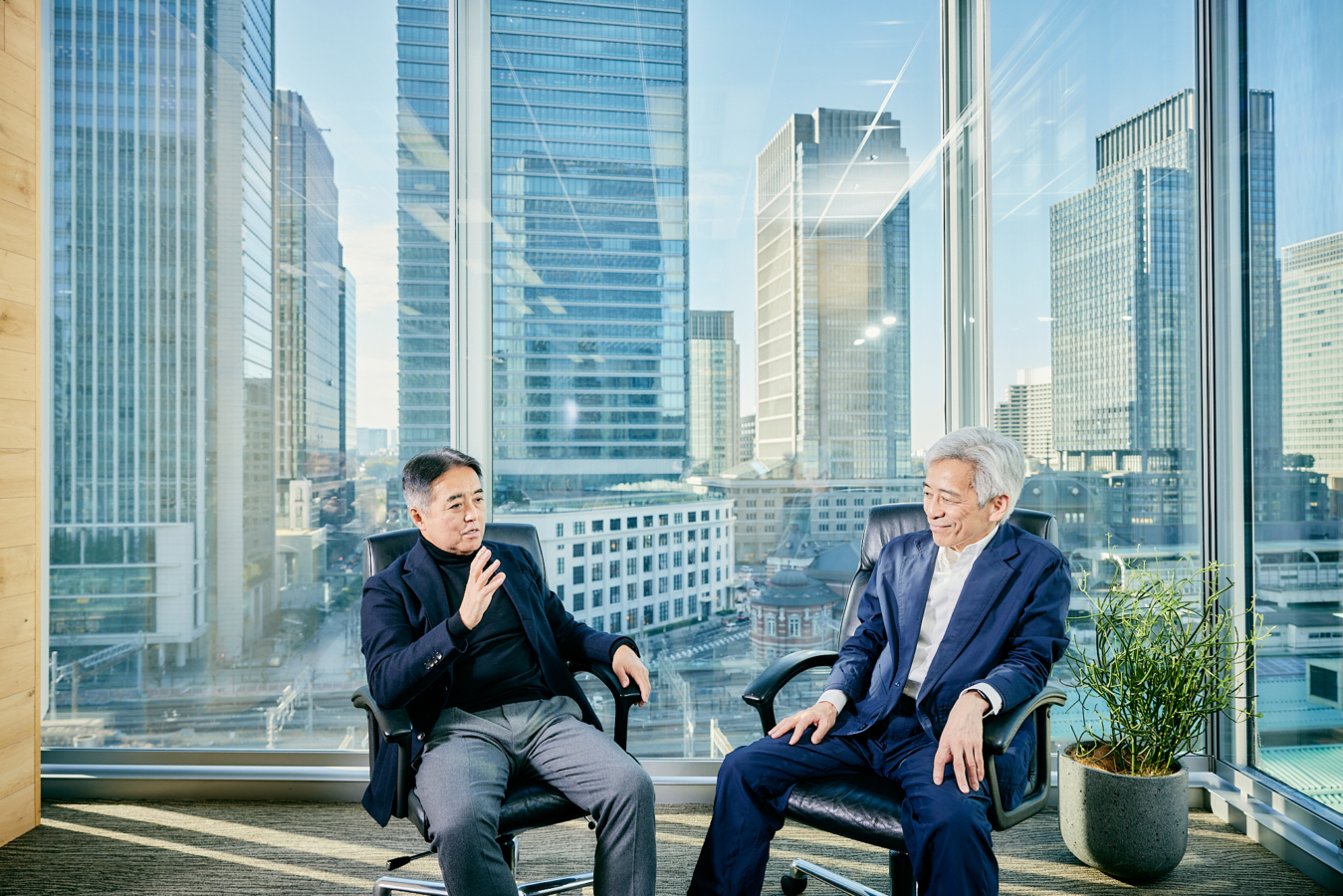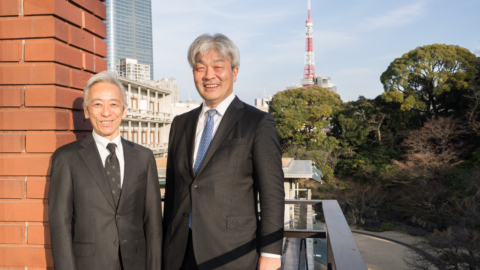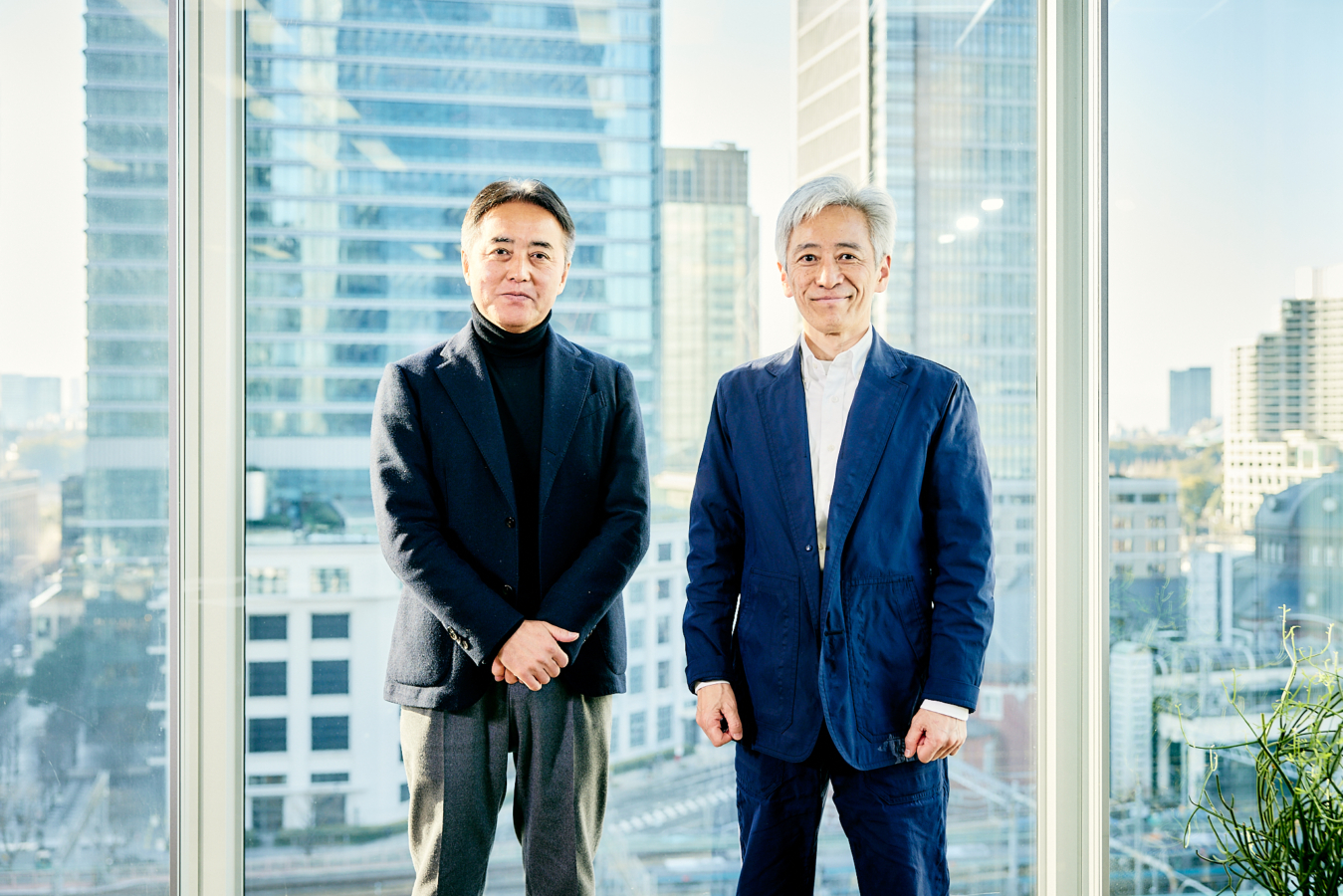
How can an organization continue to demonstrate value at a global scale?
IGPI Group has been expanding its overseas offices in areas such as the Nordic and Baltic region, Singapore, and Shanghai, with the hope of contributing to the world’s business management and economy. In this interview, Takashi Muraoka, CEO of IGPI, discussed with Masato Iwasaki, current IGPI Senior Executive Fellow formerly responsible for leading the global transition of Takeda Pharmaceutical Company Limited, on how to accelerate globalization within companies.
There is no success in globalization without inevitability
Takashi Muraoka IGPI has had deep relations with Takeda Pharmaceutical Company Limited (“Takeda”) from the time of its establishment, when Takeda fully supported our philosophy and became our shareholder. IGPI aspires to build a new paradigm in the world’s management and the economy, but it would be impossible to learn the cutting-edge management styles of the world if we only operated within Japan. I believe Takeda is one of the few Japanese companies that have demonstrated global management. Today, I’d like to learn two things from your experience at Takeda: the process and challenges of paving the way towards global management over the past two decades, and how Takeda made decisions and implemented what to unify across the world while also acknowledging diversity. I believe both are valuable lessons that can be applied universally.
Masato Iwasaki The reason behind Takeda’s globalization was not because we wanted Takeda to become a global company, but rather because it was inevitable given the changing nature of the pharmaceutical business. With R&D of new drugs becoming more sophisticated, success rates have been declining significantly while R&D costs have doubled or even tripled due to the usage of new technology in the process. This meant that it was no longer profitable for us to continue focusing on one closed market, Japan.
In addition, when you consider the product life cycle of a drug, it is possible for one drug that has seen the end of its time in one market to be continuously used in other parts of the world. For example, in developed countries, the market for so-called lifestyle-related diseases is currently large, but in developing nations, the most value lies in antibiotics, just like Japan back in the days. Even if the needs currently differ between countries, they could all experience similar diseases in the future. This is why Takeda decided to create drugs that could contribute to medicine not just in our current world, but throughout the next decade. As this decision could not be realized without globalization, we had no doubts but to take the course.
TM I see, so to proceed with globalization, inevitability becomes key. At IGPI, in order for us to realize our purpose and founding philosophy, we must constantly learn from the leading management initiatives of the world, experience them ourselves, and refine and convey them through theory and practice. Furthermore, in order for us to be involved in management through investment, we must have capital, which consequently means we must be globally scalable. Given these two points, I believe we cannot fulfill our role unless we become a group with a global presence. Of course, this requires us to utilize the strategies unique to IGPI, such as combining the L (local) and G (global) for our development. As we are currently in the phase of accelerating these efforts, we would love to hear from you any tips and advice you may have for us.
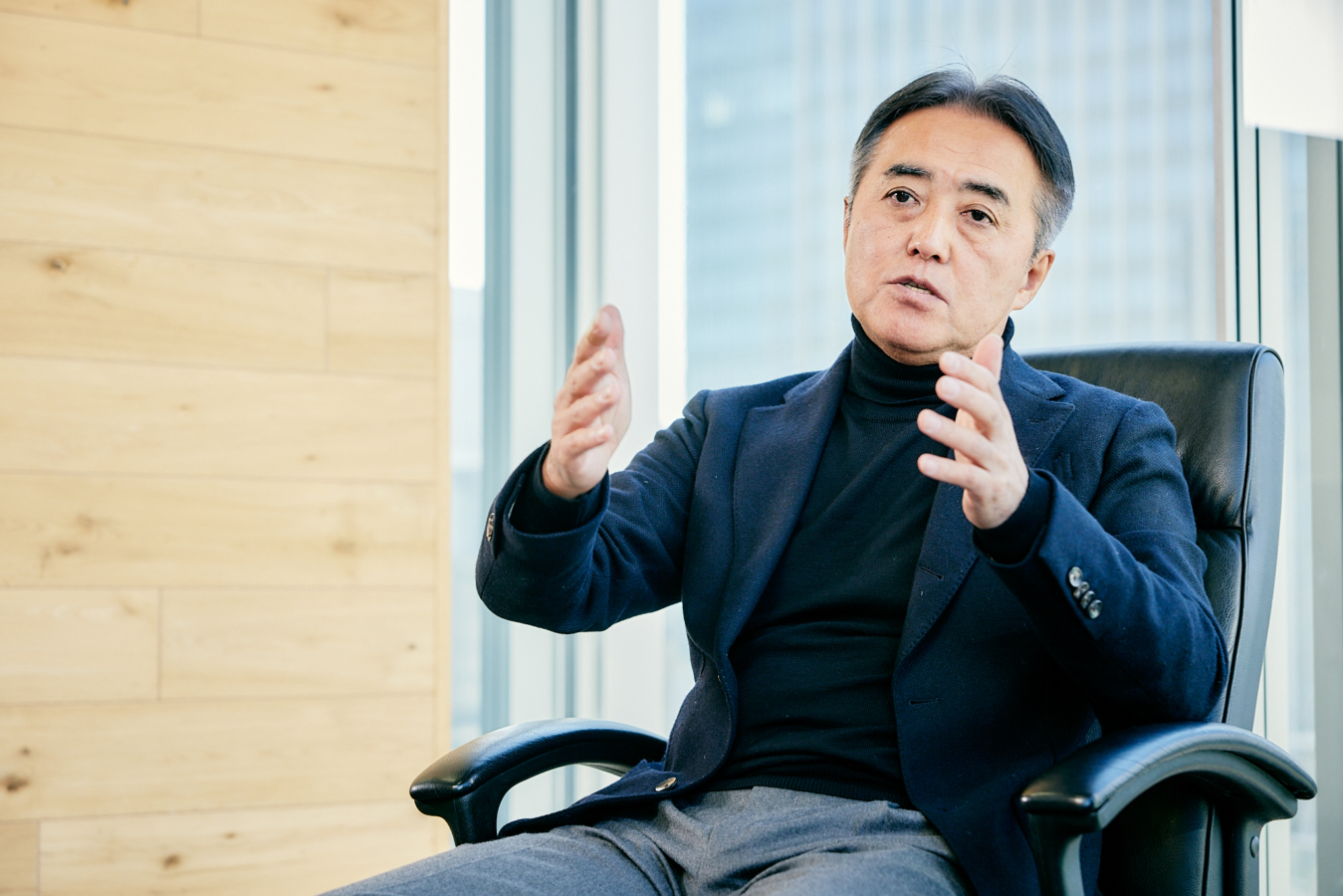
MI As a prerequisite for acceleration, it is important to have your employees understand the direction you are taking them. At Takeda, we were fortunate that Mr. Kunio Takeda, from the founding family, was a mastermind of words. He often repeated the phrase, “We should become a highly integrated, R&D-driven, Japan-oriented global pharmaceutical company”, which sounded complex, but at the same time extremely eloquent and comforting. I believe that once something is verbalized, we humans can start to understand.
We tried various approaches towards globalization, but it did not go as planned. Initially, as with many other Japanese companies, we decided to hire local management, and sent Japanese employees over to manage and monitor them. However, this did not go well. You cannot build trust with this approach, nor can you encourage diversity. After realizing this, I reframed the purpose of sending someone from Japan to not manage and monitor, but to have them learn the local ways of business.
We also went through many cycles of trial and error with the setup of overseas offices. First, we moved the R&D headquarter function from Japan to Chicago. This was because I thought in order to assess innovation, convert it into value, and to make the next investment, we needed the dynamics of the U.S. rather than of Japan. However, this was not enough to make things work. Next, we gathered researchers in Shonan and created a global site for basic research. Unfortunately, Japan’s strength in small molecule compounds had been left behind in the global trend. On the other hand, Boston led the research in biologics, which was what we needed for the drugs we were working on. Therefore, we moved all our research related to biologics to Boston, and kept our research on small molecule compounds and iPS cells, Japan’s world-class innovation, in Japan. Focus on your strengths in the environment that plays to your strengths. It may be an obvious principle, but this may be a useful tip for IGPI.
TM Given that the skills and technology of management are evolving day by day, it seems crucial to locate yourself where evolution is quickest, and to create an environment where you could focus on innovation. This could perhaps be the U.S., or Singapore if in Asia.
MI Since IGPI has its investment-related organizations in the Nordic region, I believe IGPI can build its network there too. Also, it could effectively use its Singapore base. Singapore is home to many overseas offices of American and Japanese companies, and there are also companies that have paved the history of evolution within Singapore. I am personally interested in Singapore’s healthcare and insurance systems, but with innovation happening in other areas as well, the country is definitely rich in diversity.
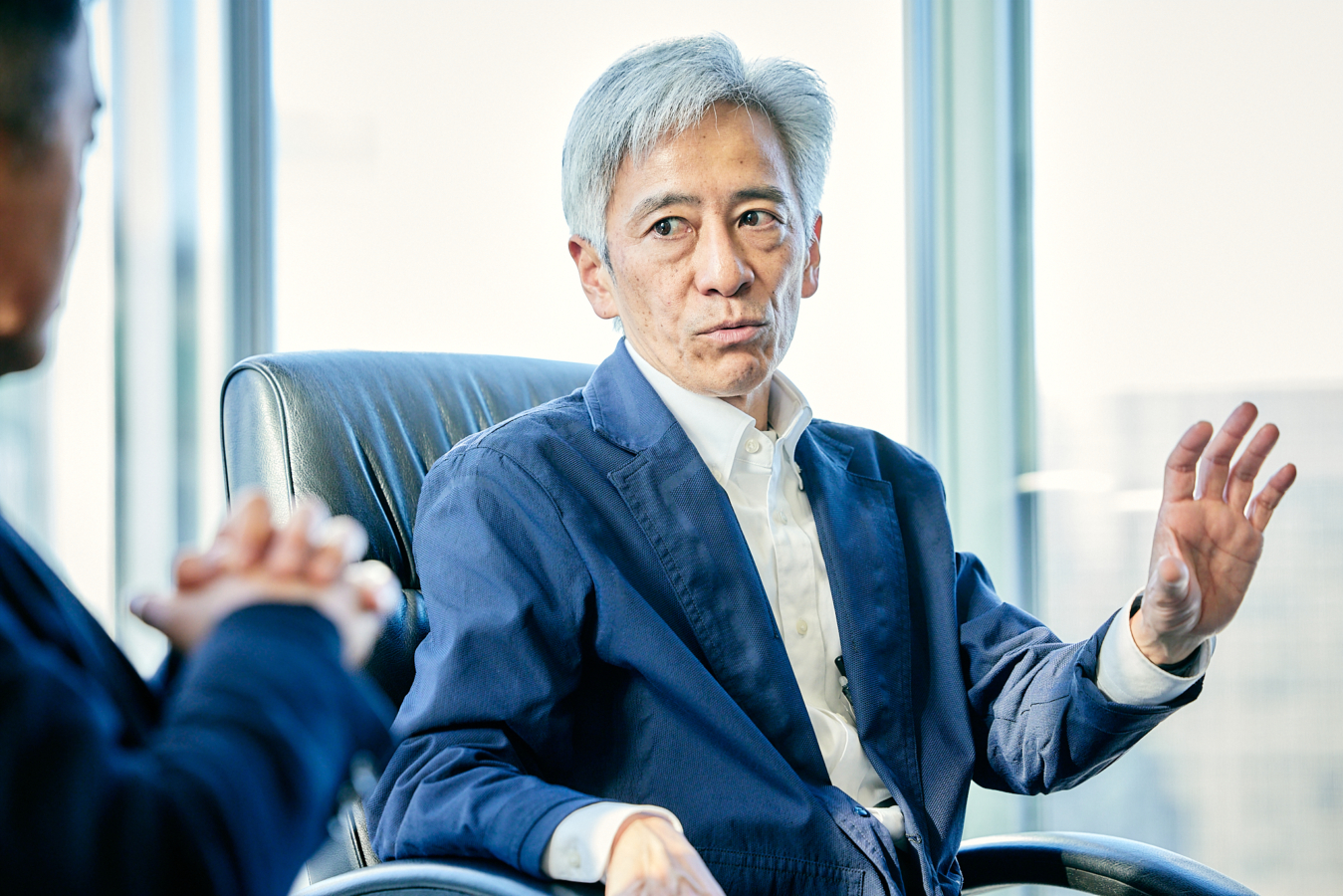
By changing the layer, diversity and unity can go hand in hand
TM IGPI Group needs people who are skilled at local corporate management as well as people who are skilled at global cross-border projects. However, it is impossible to evaluate them by one set of standards, and there are also language and cultural barriers. How do you manage such teams at Takeda?
MI That is a challenge we struggle with to this day. For example, when people talk about “global”, it is commonly misinterpreted as “the U.S.”. Our employees in Japan often made remarks such as “The Americans are better off” and “We have been left behind”. To this, I always responded with a question: “Why do you compare yourself to just the U.S., when we operate in 80 countries over the world?” In parallel with such conversations, we also unified the evaluation of management globally, giving more weight to the perspective of how much they are contributing to the global growth and the entire company. Though it is not as easy to unify compensation structure and titles due to various circumstances, it is important to unify at least the policy. If you ask 10 employees what kind of an organization they are, and what they are contributing to, would they all be able answer in the same way? This becomes the key to success.
TM At Takeda, you did not change the corporate culture or purpose, but repeatedly communicated the same message, which eventually led to everyone coming to a mutual understanding, and even the global employees believing the same. On the other hand, those who could not agree with the message would naturally leave the group. This is a necessary mindset for both Japanese and global companies to have, and it is also a mindset that seems to directly reflect human nature.
MI That is one of the lessons we learned through trial and error. For example, when we acquired one company, we decided to place them independently even under the umbrella of our large corporate group, in order to have their people stay. However, all the top-tier members who had created the company’s culture ended up leaving. Yet, there are always people in every organization that favor Takeda-ism, and those are the people that end up contributing greatly. After several such learning experiences, I’ve come to believe that what’s most important is not the surface-level culture, but rather the purpose of our company – what we do and why we are here.
TM What I find fascinating about Takeda is that it has repeatedly taken risks with conviction, learned from failures, then taken even further risks, experiencing larger failures and learning from them. IGPI aspires to be like Takeda, and to also support more of such companies to emerge within Japan.
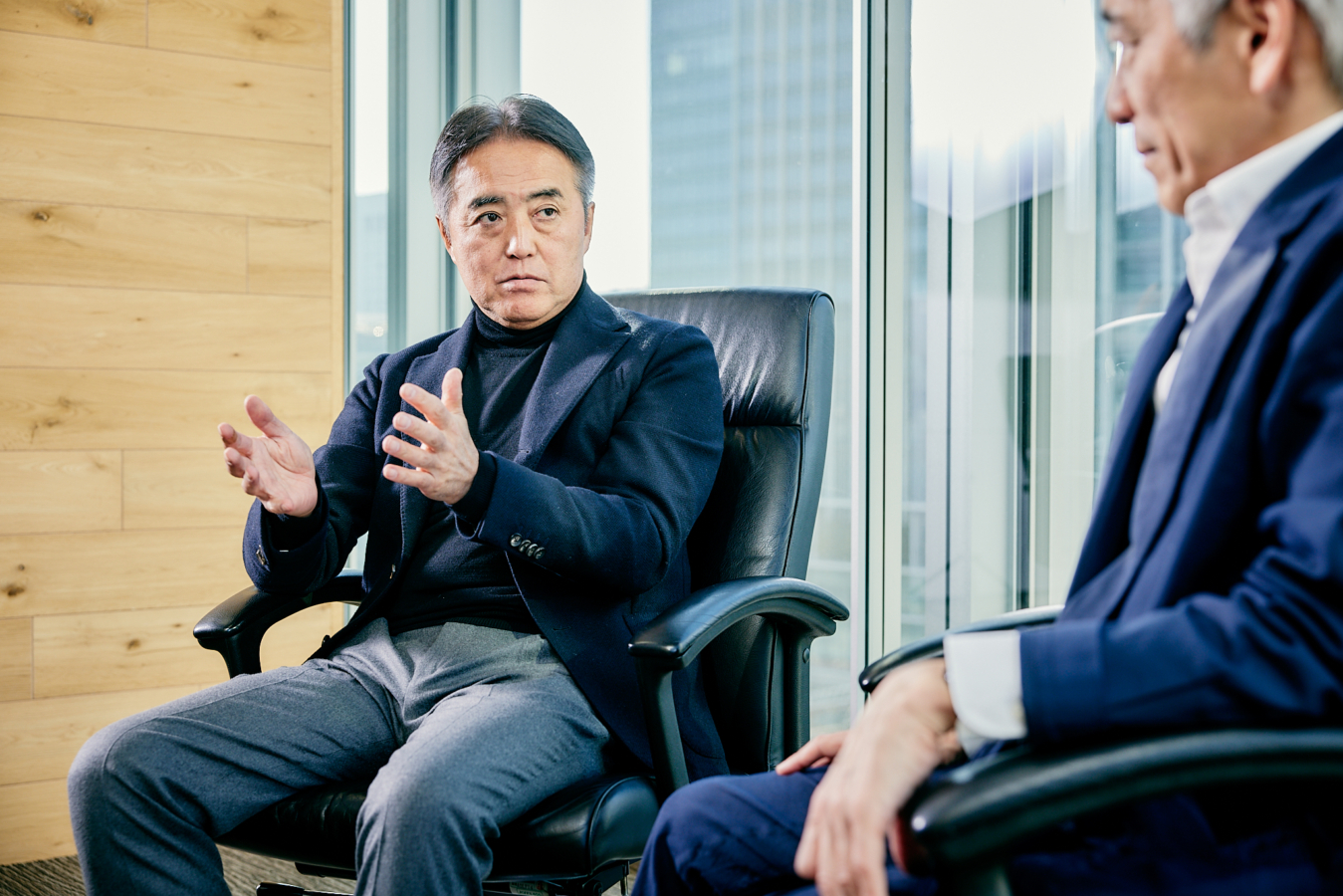
Have you really experienced being the “nail that gets hammered down”?
TM What do you think about the current challenge Japan faces with slow progress in innovation?
MI Recently you would often hear phrases such as “Heiwa-boke (naive, numb with peace)” and “Lack of risk awareness”, but if people truly feel at risk, they would take action. As technology advances at the current speed and as the environment and business models change, people will inevitably realize that holding onto the illusion of the status quo is a great risk in itself. This is why it is crucial to delve deep into a dialogue with one another. For example, if there is a person who is satisfied with the current business model, ask them how long they think it would last. Would it last for 3 years, 5 years, 10 years? As you keep asking, anyone would be able to sense that the business model will no longer hold true at some point in the future. Then, you would ask, when should you make the change? As you start thinking like that, you will understand the size of the risk. These are the questions that management should be asking.
TM For IGPI, now is the time for change. We plan to change the group structure to that of a holding company, so that we could explore strategic new businesses in a more agile manner both domestically and internationally. This would help each subsidiary company to swiftly form capital and business alliances with external parties. For IGPI Group members, this would mean more opportunities for challenges in new areas, and thus we would like to further promote our FA (free agent) system as well.
MI It would be nice to see more diversity in the organization. One cannot notice other options until they expose themselves to others with different sets of values. If there is more diversity in the way of thought, I believe IGPI would be able to leverage its strengths it has nurtured to date and exert tremendous value in the world.
TM That is definitely an area worth investing in. Ever since our establishment, we have cherished bringing together people with similar values to add higher value. I do not think this was wrong, but I also believe that by moving up the values by one layer, you can expect the values to become more universal, with the layer underneath representing diversity in origin, gender, nationality, and cultural background.
MI I agree. It’s easy to assume that the more global you become, the less you have in common, but that is not true. For example, you could think “If this project goes well, I want to treat myself to a delicious meal with my loved ones”, which is a common feeling amongst everyone. However, the type of cuisine they imagine may not be the same – it could be Chinese or Japanese. This is the same with business. One of the roles of a partner is to find something in common amongst their team and people. Once you are able to remind yourself of the common goal that your team holds, globalization is not that difficult.
TM How Takeda realized diversity and transformed it into power, all without changing the Takeda-ism, is something we would love to learn from. IGPI’s purpose statement, “Pioneering a new era of management”, is a message that is globally applicable. Going forward, we would like to further communicate this with confidence, both internally and externally.
Finally, could you give a message to the younger generation?
MI In various open discussions in the past, I have heard from junior members in Japanese corporations that they feel their workplace is stagnating and does not tolerate failures. However, have they really experienced this? Perhaps the seniors have experienced being the “nail that gets hammered down”, and they are educating the younger employees about this, but this is nothing but a risk that the management must be responsible for.
In addition, I would like to tell the younger generation to not underestimate their capabilities. People tend to limit their potential by giving excuses such as the few years they’ve been at the company, their junior title, their lack of experience in the job, etc. Even if a certain decision cannot be made by them alone and needs the approval of their manager, if they propose with conviction, most of their proposals should go through.
TM Our organization is basically flat, and there are no restrictions based on one’s title. Just because you are an associate doesn’t mean you cannot make an investment or generate large projects. IGPI is financially stable, and is fully willing to take risks, so I encourage young people to proactively make proposals.
MI From all the people I have met so far, I believe the people at IGPI have tremendous potential. Compared to employees who are responsible for one segment within a large company, while the depth of knowledge may differ, the people at IGPI have a much broader worldview. They do not need to limit themselves at all, because they have the potential to continuously demonstrate value.
